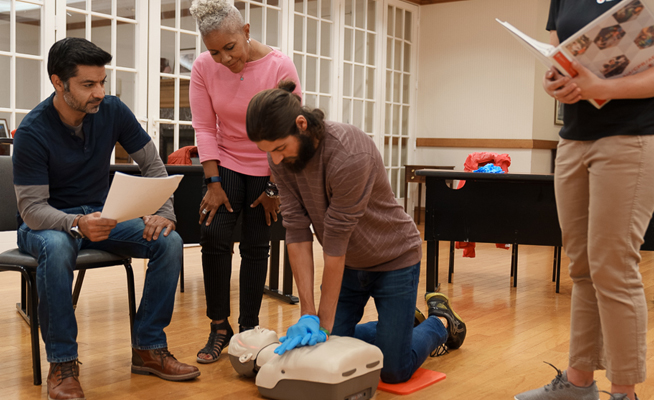Why Should You Consider Learning CPR Skill Change Your Life
Learning CPR Skill That Can Change Your Life
Learning CPR Skill or Knowing how to administer cardiopulmonary resuscitation (CPR) may be a valuable skill to have in the event of a medical emergency since it can save a person’s life. This crucial ability has the potential to determine whether or not a person lives or dies under precarious circumstances. In this piece, we will discuss the many compelling reasons why being proficient in cardiopulmonary resuscitation (CPR) is a life-altering skill that everyone ought to give serious consideration to mastering.

1. Responding Immediately Can Help Save Lives
In cases of cardiac emergency, the passage of moment is of the utmost importance. When someone suddenly goes into cardiac arrest, their odds of life drop dramatically with every minute that passes. When performed immediately, cardiopulmonary resuscitation (CPR) may assist in maintaining the circulation of blood with oxygen flow to essential organs until expert assistance is received.
2. Cardiopulmonary resuscitation performed by bystanders improves survival rates
According to the statistics, the majority of cardiac arrests take place outside of hospitals, most often inside of homes or in public locations. The ability of bystanders to perform CPR, or cardiopulmonary resuscitation, may be a decisive factor in whether or not a life is saved. Learning how to do cardiopulmonary resuscitation (CPR) equips you to offer aid in an emergency, considerably boosting the victim’s odds of surviving the event. You may research your alternatives for CPR certification.
3. You Might Just Be Able to Protect Someone You Love
Imagine yourself in a predicament in which a member of your family or a close friend suddenly loses consciousness because of a cardiac arrest. Having knowledge of cardiopulmonary resuscitation might be the distinction between watching someone’s condition worsen hopelessly and taking action that could save their life. Learning how to do cardiopulmonary resuscitation (CPR) gives you the ability to become a hero among your own family and friends.

4. Self-Assurance under Dangerous Circumstances
Emergencies may cause a lot of confusion and anxiety. You will feel more confident in the capacity to react appropriately if you have the understanding and training to administer cardiopulmonary resuscitation (CPR). This self-assurance may assist you in maintaining your composure and being cool in the face of a potentially fatal circumstance, which enables you to deliver the highest level of care possible until expert assistance comes.
5. It Is Simple to Understand
It is a common misconception that in order to learn cardiopulmonary resuscitation (CPR), one must have previous experience in the medical field. People of all ages and from all walks of life may participate in training programmes since they are widely offered and intended to be user-friendly. These programmes will teach you the fundamental techniques, such as how to do chest compressions with rescue breathing, making it simple for anybody to learn how to perform CPR.
6. Acquiring Valuable Skills for Everyday Life
Learning how to do cardiopulmonary resuscitation (CPR) is not only an important part of being well-prepared for unexpected events; it is also an invaluable life skill. It is the information that you can take with you during your whole life and use to possibly make a difference in a variety of circumstances. The capacity to perform well is a valuable asset that may be of use not only to you but also to people who are in the vicinity of you, regardless of whether you are at their homes, on the job, or in an open-air setting.

7. Protection under the law
People who perform cardiopulmonary resuscitation (CPR) in an emergency situation in good faith may be afforded certain legal protections in some countries. When you help someone in need, having knowledge on how to do cardiopulmonary resuscitation (CPR) and acting quickly may protect you from any legal liability and provide you piece of mind.
The final word
In conclusion, cardiopulmonary resuscitation (CPR) is a skill that may change someone’s life and should be considered by everyone. It gives people the ability to take rapid action in dangerous circumstances, which improves their chances of surviving as well as giving confidence while dealing with crises. Training in cardiopulmonary resuscitation (CPR) is an excellent way to improve one’s knowledge and capabilities, and it may be beneficial whether one’s goal is to become a hero for one’s loved ones or to become an accountable member of one’s community.



